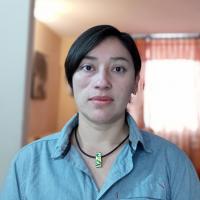
Patricia Castillo-Briceno
Latin America & Caribbean
Ecuador
I share my perspective as a Latin American women who developed a STEM career in high-income countries, and who knows the challenges to continue a STEM career when coming back to our countries, who has the grit required to overcome the challenges, and who is convinced of the need for networking and sorority for a sustainable participation of women in sciences at all levels.
Vision statement
We start with having more Latin American women in sciences recognized for their achievements, locally, regionally and internationally. Rising role models for the children and the youth that deserve to grow up in an environment where female scientist are the quotidian and not the exception, where academic careers are accessible options for Latin Americans, and where parity in studying STEM careers and social sciences careers became a reality. This recognition of women in sciences must go beyond visibility to structural support, and the funding, training and other activities by OWSD are key factors. Thinking about when going abroad is a decision and not the only option because in our countries there not enough resources or access to the infrastructure to do research. Here, I share my perspective as a Latin American women who developed a STEM career in high-income countries, and who knows the challenges to continue a STEM career when coming back to our countries, who has the grit required to overcome the challenges, and who is convinced of the need for networking and sorority for a sustainable participation of women in sciences at all levels. I have the experience in interdisciplinary research collaborations, international cooperation, and in advocacy for gender equity and diversity in science. In summary, I want to contribute with the perspective and my network environment, and also I expect to gain perspective and strengthen the network from the experience on the OWSD board.
Candidate’s bio
As a child, the ocean and its amazing animals fascinated Dr. Patricia Castillo-Briceno. She spent her childhood in the Ecuadorian highlands in Quito, where she was born, but life took her to the coast as a teenager. To see marine life and new places was as challenging as it was beautiful, and she believes that was training to manage the forthcoming. She went to study marine biology in Bahia, the only place in Ecuador where that career was available, and graduated enlisted as a volunteer to the Galapagos, working with marine iguanas and meeting scientists from different part of the world. The different experiences moved her to apply for scholarships to do her PhD, the first in her family. Moving and starting again, studying a lot and living in new places has become a common and enjoyable feeling for her now. It is the excitement and decision on each challenge, the recognition of sciences as a need for development, and the need of more diversity for the advancement of sciences. This was particularly clear after her PhD studies in Spain, and then in France for her postdoctoral research. There, she could apply and obtain competitive scholarships and grants, publishing and participating in international congresses, and enjoying a personal and professional community with good access to top technology. This scenario did not exist in Ecuador when she left in 2006 to pursue my PhD, but should available for everyone. In 2014, she came to Ecuador with a call for international researchers willing to transfer all they had learned - to put her knowledge to service for the development of her country, to strengthen higher education quality; and to promote diversity in sciences. Unfortunately, the technology needed for her research project was almost inaccessible, due to importation and local policies. Her project was on physiology applied to assess climate change impacts, and denial was locally strong too; gender equity in academia was also still a remote concept. These different kinds of challenges led her to see the need for the advancement of sciences in Latin American countries in a new perspective. To find or create options; to reach and inform strategic stakeholders and decision makers; to involve scientists from other institutions; to work with international cooperation organizations; and a lot of networking. She has also participated as national expert on national environmental law for the WOA II of UN Regular Process, and the work keeps going.











































